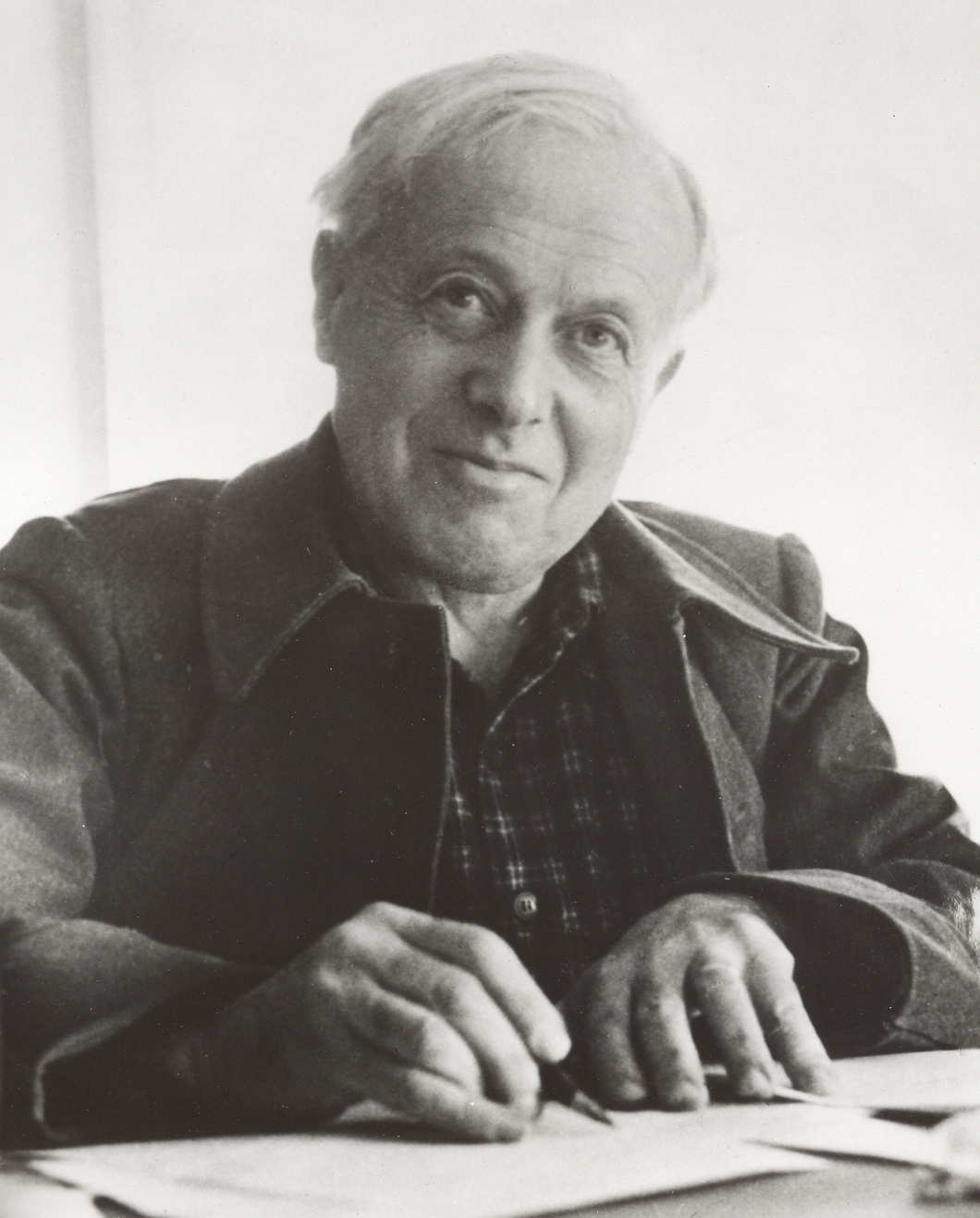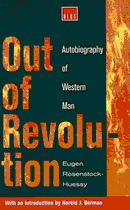 I began reading Out of Revolution without much awareness of its context or why Eugen Rosenstock-Hussey (after, ERH) was motivated to write it. As I realized ERH is writing soon after his leaving Nazi Germany for America, and is looking at a post-war world from the perspective of his own time, but a pre-war time from the perspective of hindsight, knowing that world conflagrations was around the corner for him, provide a sense of foreboding as well as sympathy. And it means I have to be careful when I read him say, in chapter 2, that the time of national war is over. He is specifying that no one nation will go to war with another nation. And in fact, that is the case.
I began reading Out of Revolution without much awareness of its context or why Eugen Rosenstock-Hussey (after, ERH) was motivated to write it. As I realized ERH is writing soon after his leaving Nazi Germany for America, and is looking at a post-war world from the perspective of his own time, but a pre-war time from the perspective of hindsight, knowing that world conflagrations was around the corner for him, provide a sense of foreboding as well as sympathy. And it means I have to be careful when I read him say, in chapter 2, that the time of national war is over. He is specifying that no one nation will go to war with another nation. And in fact, that is the case.
Chapter one begins as I cited in my earlier post “Our passions give life to the world, our collective passions constitute the history of mankind.” That is to say, for a collective action like war or co-operation, a particular human passion must be highlighted that there is unanimity and coherence to human action. We won’t get together unless there is a collective passion impelling us. ERH goes on to say that the differing passions stimulated in different societies produce different kinds of people.
ERH says you might think that every kind of passion and belief is being tried and abandoned, if we look at history in the near and far. But his book will actually make a different claim, that the next passion of a society is a logical outflow of the passion that is waning or loosing its hold. ERH is very aphoristic in this chapter, and loves analogies to love and marriage
“The heart of man either falls in love with somebody or something, or it falls ill”
“When and were we love or fear, we are willing to pay”
ERH explains that the idea of the book comes out of his (and others) experiences of the trenches of WWI. The experience is his motivation for founding a new future for Europe, and to “provide a new history for mankind.” The Great War, for ERH can’t just be fit into the history of man’s wars, as a sequel to the Napoleonic Wars. Instead, it changes how we understand that past history because a new future comes from it. “A new love, a new home, a new conviction” changes our regard for our past.
ERH allows that persons might quibble with some aspects of this revision of the past, but its impossible to truly find a stance from which the World War is not a new epoch. All contemporaries will agree with his stance: all who do not, reveal themselves to not even be contemporaries. ERH admits that ‘to the people at home’ the war could be a different thing than to the soldiers, but
…all these niceties of a spectacular world history have lost their meaning since the solidarity of twenty million men has nailed all the surviving soldiers to the same cross of reality. The world’s history is our own history
ERH comes then, to the subtitle of Out of Revolution: “An Autobiography of Western Man”. In reading the current moment as a central date that changes the past, he says we will center equally on the future, the present and the past (and ERH will set WWI in the context of the last 1000 years of European history. As a side note, the methodology seems reminiscent of what is called ‘whiggish history’ where ever-greater freedom naturally arises. I think ERH instead sees constant revolutions occurring that provide changes, but it may not be as if the goal is knowable)
In a typical ERH move, he puts forth the idea of a calendar and holiday as reflecting the epochal changes of a society. Marking a new holiday is a political act, always, and ERH will pay attention is his history to such holidays both secular and churchly. Rather than retreat into abstract ideas or statistics, ERH will focus on events that have marked “more than one generation,” and in the quote below, expounds on why:
Guy Fawke’s Day, the Wedding of Figaro, a holiday like All Souls’, and the sun-song of St. Francis are better illustrations of history than our reasoning. I have tried as much as I could to let them speak for themselves. Every human being is endowed with the wonderful gift of speech. He can express his own secret better than anybody else. We rarely reveal our true selves in the market place of life. Words often seem to be made to hide our thoughts. But the more we try to avoid emphasis or even truth in our speech, the more the few moments stand out in which language has the full weight of self-expression. A bride speaking her decisive “Yes” or “No” before the altar uses speech in its old sense of revelation, because her answer establishes a new identity between two separate offsprings of the race and may found a new race, a new nation. We are so dull that we rarely realize how much history lies hidden in marriage, and how the one word spoken by the bride makes all the difference between cattle-raising and a nation’s good breeding.
(I include this extended section because it exemplifies ERH’s writings and interests in speech and its relation to new beginnings for history, as the coming together through fruitful marriage)
ERH spends the rest of the preface laying out two sections of his work. He distinguishes the American revolution from the French and Russian, German and English secular revolutions made by the ‘temporal power’ He is going to cover 900 years of history as “a very short story” of “not more than twenty-seven generations”
He invites the reader to collaborate, to add what he knows of French or Italian history to “round out our draft”. He says he is slow of thought, with only one big idea, and and his slowness means that the last 20 years of time have brought changes faster than he can manage. He is aware of this crime in pointing back at the war, but he will ‘boast of his sins” nonetheless.
A last quote
My predecessors in the field of political thought have poured the strong wine of progress into the water of human traditions, lest their generation miss its opportunities. I wish to pour the water of patience into the strong wine of revolutionary excitement, so that my contemporaries may not waste their time in feverish and fruitless efforts.


 I began reading Out of Revolution without much awareness of its context or why Eugen Rosenstock-Hussey (after, ERH) was motivated to write it. As I realized ERH is writing soon after his leaving Nazi Germany for America, and is looking at a post-war world from the perspective of his own time, but a pre-war time from the perspective of hindsight, knowing that world conflagrations was around the corner for him, provide a sense of foreboding as well as sympathy. And it means I have to be careful when I read him say, in chapter 2, that the time of national war is over. He is specifying that no one nation will go to war with another nation. And in fact, that is the case.
I began reading Out of Revolution without much awareness of its context or why Eugen Rosenstock-Hussey (after, ERH) was motivated to write it. As I realized ERH is writing soon after his leaving Nazi Germany for America, and is looking at a post-war world from the perspective of his own time, but a pre-war time from the perspective of hindsight, knowing that world conflagrations was around the corner for him, provide a sense of foreboding as well as sympathy. And it means I have to be careful when I read him say, in chapter 2, that the time of national war is over. He is specifying that no one nation will go to war with another nation. And in fact, that is the case. The quote above begins Eugen Rosenstock-Hussey’s mammoth “Autobiography of western man” Out of Revolution. I’ve had it sitting on my shelf for about 10 years since my interest in Rosenstock-Hussey (hereafter, ERH) was piqued and I picked up a number of books. I’ve read his shorter works, “Speech and Reality” and (another one whose name escapes me). What I believed about the book, Out of Revolution, coming to it cold was that this was a book where ERH gave a historical overview of revolutionary periods of western history, including the French and Russian, coming at them as someone who doesn’t think the idea of “revolutions as such” were all necessarily bad. Since ERH was a professing Christian, and my understanding of him was mediated though conservative appreciation, I wondered how he would possibly square that circle.
The quote above begins Eugen Rosenstock-Hussey’s mammoth “Autobiography of western man” Out of Revolution. I’ve had it sitting on my shelf for about 10 years since my interest in Rosenstock-Hussey (hereafter, ERH) was piqued and I picked up a number of books. I’ve read his shorter works, “Speech and Reality” and (another one whose name escapes me). What I believed about the book, Out of Revolution, coming to it cold was that this was a book where ERH gave a historical overview of revolutionary periods of western history, including the French and Russian, coming at them as someone who doesn’t think the idea of “revolutions as such” were all necessarily bad. Since ERH was a professing Christian, and my understanding of him was mediated though conservative appreciation, I wondered how he would possibly square that circle.